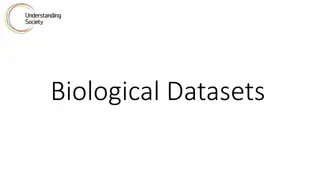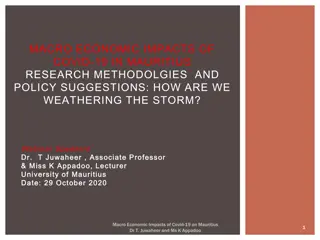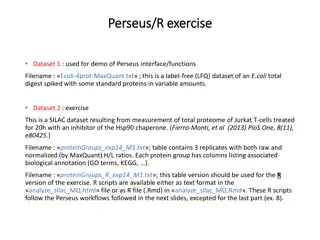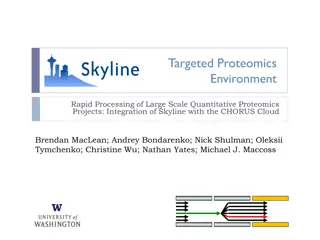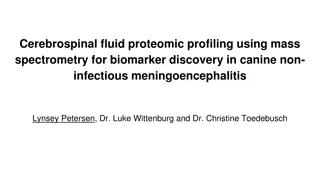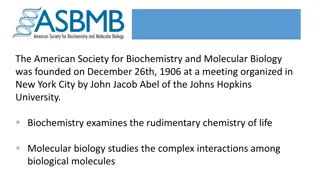Exploring Proteomics: Types, Applications, and Impacts
Proteomics involves the study of proteins in organisms and encompasses various types such as functional proteomics and structural proteomics. This field has wide-ranging applications in areas like biomedical research, agriculture, and drug development. Utilizing techniques like mass spectrometry, proteomics plays a crucial role in understanding protein structures, functions, and interactions within cells.
Download Presentation

Please find below an Image/Link to download the presentation.
The content on the website is provided AS IS for your information and personal use only. It may not be sold, licensed, or shared on other websites without obtaining consent from the author. Download presentation by click this link. If you encounter any issues during the download, it is possible that the publisher has removed the file from their server.
E N D
Presentation Transcript
Content Content Proteomics Types of proteomic Application of proteomic Genomics Application of Genomics Metabolomics Type of metabolomics Application of Metabolomics Nutrigenomics
Proteomics Proteomics The study of structure and function of protein including the way they work and interact with each other inside the cells. Proteome is derived from genome by gene expression. Proteomics refers to large scale study of total protein of an individual. In other word, proteomic also refers to identification and analysis of entire protein content.
Type of proteomics Type of proteomics Functional Proteomics - The major goal of functional proteomic is to elucidate the biological function of protein. It include identifying protein function characterization of enzyme activities. This type of proteomics is performed by large-scale measurement of enzymatic activites of kinase or protein modifying enzymes.
Structural Proteomics Structural Proteomics The major goal of structural proteomics is to characterize the three-dimensional structure of protein. It help to understanding the target sites of protein, where drugs bind. This type of proteomic is generally done using X-ray crystallography and NMR spectroscopy.
Expression Proteomics Expression Proteomics It is also termed as differential proteomic and its objective to identify or analyze protein expression in an organism. Expression proteomic is genereally done using 2D-gel electrophoresis and mass spectrometry.
Application of Proteomic Application of Proteomic Biomedical Research Clinical Medicine Agriculture Environmental Science Food Science Pharmaceutical and Biotechnology Neuroscience Forensics Microbiology Proteogenomics
Biomedical Research Biomedical Research Disease Biomarker Discovery- Proteomics helps identify protein biomarkers for diseases like cancer,Alzheimer and diabetes. Drug Development- It assists in drug target identification and validation, as well as drug efficacy and saftey testing. Agriculture Agriculture- - Crop Improvement- Proteomics can identify proteins related to stress resistance,yield,and nutritional content in crops.
Pharmaceutical and Biotechnology Pharmaceutical and Biotechnology Biopharmaceutical Production- Proteomic is used to optimize the production of therapeutics protein like monoclonal antibodies. Quality Control- Ensure the conistency and quality of biopharmaceutical products. Forensics Forensics- - Proteomics can be used to identify individuals bashed on unique protein profiles,especially in cases where DNA analysis is not possible.
Genomics Genomics Genomics is the field of genetics that attempts to understand the content,organization,function,and evaluation of genetic information contained in whole genome. Frederick Sanger is the father of genomics. A genome refers to complete set of genes in an organism. The entire genome of human was decoded in 2003 as Human Genome Project . As per report, about 22,300 protein-coding genes have been identified in human being.
Application of Genomics Application of Genomics Medicine Agriculture Biotechnology Evolutionary Biology Environmental Science Forensic Bioinformatics Nutrition and Health Genetic Counselling
Medicine Medicine Disease Diagnosis- Identifying genetic markers for diseases allows for early detection. Pharmacogenomics- Customizing drug prescriptions bashed on genetic profiles to enhance efficacy and reduce side effect. Biotecnology Biotecnology- - Biopharmaceutics- Genomic information is used to develop biologic drugs and therapies.
Forensics Forensics DNA Profiling- Genomic techniques are crucial in criminal investigations for identifying individuals. Anthropology Anthropology- - Human Evoluation- Genomics provides insights in to human evolutionary history and migration patterns. Nutrition and Health Nutrition and Health- - Nutrigenomics- Studying how an individual genes affect their response to diet and nutrition.
Metabolomics Metabolomics The term metabolome refers to all metabolites in a cell,tissue,organ, or organism which are the end products of cellular and chemical processes. The scientific study of metabolome is termed as metabolomics . NMR spectroscopy also helped in identifying and measuring different metabolites in the body fluids.
Types of Metabolites Types of Metabolites Endogenous metabolites- These are formed inside the body and these include glucose,hormones etc. Exogenous metabolite- These are foreign in nature and enter in the body from outside e.g. drugs These are also termed as xenometabolites. The study of such extracellular(foreign) metabolites is termed as exometabolomics.
Application of Metabolomics Application of Metabolomics Biomedical Research Nutrition and Food Science Pharmaceuticals Enviromental science Agriculture Toxicology Cancer research Neurosicence Veterinary Medicine Forsenic science
Biomedical Research Biomedical Research Metabolomics helps in understanding disease mechanism identifying biomarkers for the early detection and monitoring treatment responses. Nutrition and Food Science Nutrition and Food Science- - its used to study metabolic effect of different diets asses food quality and detect aduleration or contamination in food products.
Toxicology Toxicology it used to identify the metabolic pathways of toxins and assess their effects on organism. Nuroscience Nuroscience- - it used to study brain metabolism neurotransmitter pathways and the effect of neurodegenerative diseases. Forsenic science Forsenic science- - it can be applied in forsenic toxicology to analyze bodily fluids for drugs or toxins.
Nutrigenomics Nutrigenomics it is the branch of genomic which studies the influence variation on nutrition and influence of nutrients on genes. In this branch, a correlation is made between gene expression and metabolism of nutrients. In simple term is the study of how the food we eat interacts with our genes to influence our health.
Common Example Of Nutrigenomics Common Example Of Nutrigenomics Lactose intolearance- some persons are not able to tolerate lactose because these lack genes responsible for production of enzyme lactase in small intestine. therefore it is recommended to avoid milk in person with lactose intolerance. Phenylketonuria- Phenylketonuria an inborn error of metabolism is another example of nutrigenomics. due to genetic variation some person lack phenylalanine hydroxylase which leads to decrease in phenylalanine metabolism and its accumulation may produce neurological damage.
Application of Nutrigenomics Application of Nutrigenomics Clinical Medicine Disease Prevention Nutritional Therapy Pregnancy Nutrition Pharmaceuticals Nutritional Genomics Research Pediatrics Gerontology Food Allergies and Sensitivities
Clinical Medicine Clinical Medicine Managing chronic diseases like cancer,cardiovascular disease and diabetes by customizing dietary interventions. Disease Preventaion- Identifying genetic risk factor for diet-related diseases like obesity,diabetes,and cardiovascular disease to develop targeted prevention strategies. Nutritional Therapy- Designing diets and supplements bashed on genetic markers to manage and treat certain medical condition.
Pregnancy Nutrition Providing expectant mother with personalized dietary recommendations to support a healthy pregnancy and fetal development. Pediatrics Offering customized dietary guidence for infants and childern to promote healthy growth and development. Gerontology Tailoring dietary plans for older adults to address age- realted nutritional needs and promote healthy aging.
Nutritional Genomics Research Investigating the interaction between genes and diet to uncover new insights into human biology and disease prevention. Sport and Fitness Designing personalized training and nutrition plans for atheletes bashed on their genetic predispositions for muscle development,endurance,and recovery.










